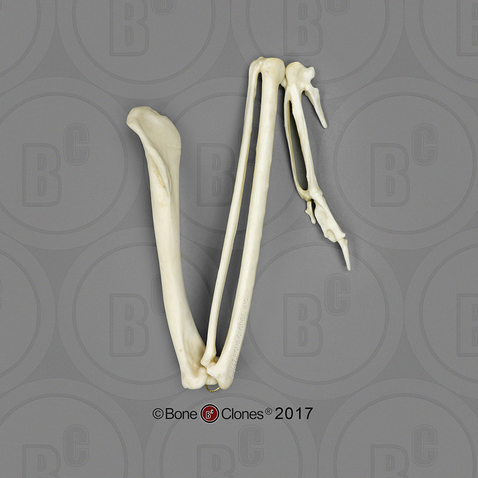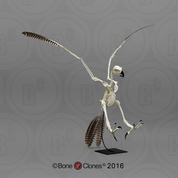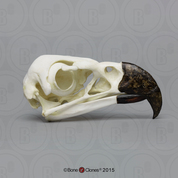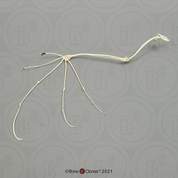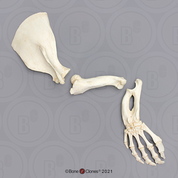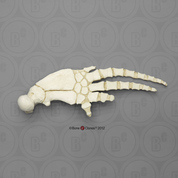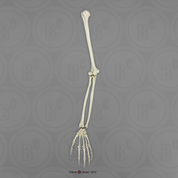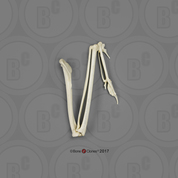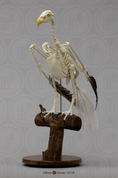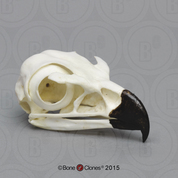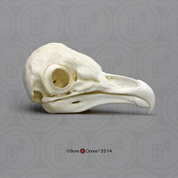-
Fields of Study
- K-12 Education
- Advanced Anatomy
- Forensics
- Physical Therapy
- Primate Locomotion
- Non-primate Locomotion
- Biological Anthropology
- Paleontology
- Bioarchaeology
- Marine-Aquarium
- Veterinary
-
Zoology
- All Zoological Items
- Endangered Species
- Skulls
- Skeletons
- Cranial Elements
- Postcranial Elements
- Eggs
- Limbs
- Teeth & Fangs
- Claws & Talons
- Brains & Endocasts
- Life Casts
- Pathology & Trauma
- Wildlife Forensics
- Sets
- Bird Sets
- Accessories
- Birds
- Mammals
- Reptiles & Amphibians
- Fish
- Sharks & Rays
- Turtles & Tortoises
- Anatomy for the Artist
- Decor
- Veterinary
- Elements
- Pathology & Trauma
-
Sets & Series
- Natural History Gift Ideas
- Decor
- Scale & Sculpture
- 3D Scanned & Printed
- Bone Boxes
- Locomotion Sets
- Forensic Sets
- Advanced Anatomy Sets
- Physical Therapy Series
- Fetal Sets
- Economy Series
- Zoology Sets
- Bird Sets
- Claw & Talon Sets
- Tooth & Fang Sets
- Primate Skull Sets
- Fossil Hominid Sets
- B.I.O.P.S.I. - Babiarz Institute
- Maxwell Collection
- Bergdorf Goodman Windows
- Accessories
- New Products
-
Our Company
- News & Specials
- Printable Handouts
- About Us
- Why Choose Bone Clones
- Bone Clones in the News
- Mission
- Contact Us
- Privacy and Security
- FAQs
- Testimonials
- Community Outreach
- Legal/Copyright
- Flyers
- Choosing Original Specimens
- Museum Exhibitions
- Natural History Gift Ideas
- About the Economy Series
- Acknowledgements
- Ordering & Delivery
- Warranty
- Refund/Return Policy
- Osteological Evaluation Reports
- About 3D Printing
- Sawyer & Maley Neanderthal Reconstruction
- Newsletter Archive
-
Human Anatomy
- All Human Anatomy
- Human Skulls
- Human Skeletons
- Head & Neck
- Postcranial Elements
- Advanced Anatomy
- Physical Therapy / Joints
- Human Brains & Endocast
- Human Life Casts
- Maxwell Museum
- Sets & Series
- Accessories
- Osteological Evaluation Reports
- Featured
- Adult Human Anatomy
- Adolescent Human Anatomy
- Child Human Anatomy
- Fetal Human Anatomy
-
Zoology
- All Zoological Items
- Endangered Species
- Skulls
- Skeletons
- Cranial Elements
- Postcranial Elements
- Eggs
- Limbs
- Teeth & Fangs
- Claws & Talons
- Brains & Endocasts
- Life Casts
- Pathology & Trauma
- Wildlife Forensics
- Sets
- Bird Sets
- Accessories
- Birds
- Mammals
- Reptiles & Amphibians
- Fish
- Sharks & Rays
- Turtles & Tortoises
- Fossil Hominids
- Non-human Primates
- Paleontology
- Forensics
All items sold on this website are replicas; no real/natural bone is available on this site. Bone Clones® are 1:1 scale unless stated otherwise. All Bone Clones® products are made in the USA.
 ALSO SEE:
ALSO SEE:
Harpy Eagle Wing, Articulated
SC-043-67-A $160.00
Bird wings follow the classic vertebrate plan for the upper limb with some modifications for flight, such as modified joints for folding and locking of wings, fused wrist bones and a reduction of digits.
The avian skeleton includes several unique features that enable flight. It is lightweight, often weighing less than the bird's feathers. Certain bones, called pneumatic bones, are composed of air-sacs supported by cross-struts, which reduces the bone's weight while maintaining its structural rigidity.
There are four basic bird wing shapes, each suited to specific environments and type of flight: Passive Soaring Wings for passively using thermal updrafts over land to soar, glide and circle; Active Soaring Wings for actively seeking air currents over oceans to travel long distances, Elliptical Wings for predator evasion, fast take offs, and short bursts of speed with high maneuverability, and High Speed Wings for prolonged high speed travel. There is one additional specialized shape, for hovering.
The Harpy Eagle, one of the largest and most powerful eagles, has a relatively short wingspan with nearly circular wings which allows them speed and maneuverability in their tropical rainforest habitat. They rarely soar, instead, they perch in the canopy listening and looking for their prey, which is mostly arboreal. Once prey is located, a Harpy Eagle will launch a rapid and agile attack, swooping through dense forest and grabbing prey directly off tree trunks and branches.
If you have a preference of right or left side, let us know in the comment section during checkout. Otherwise, we will choose.
| Scientific Name | Catalogue # | Size | Price |
| Harpia harpyja | SC-043-67-A | 22 ¾" L extended 58cm L | $160.00 |
Related Products:
Newsletter Signup
9200 Eton Ave.
Chatsworth, CA 91311 USA
© 1992-2026 Bone Clones Holdings. All Rights Reserved.
Customer Service
© 2026 BONE CLONES HOLDINGS / Made by MEV




